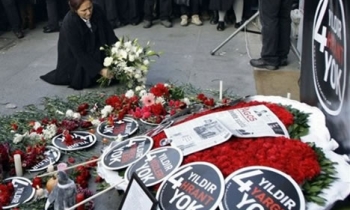The Committee to Protect Journalists (CPJ) has warned of a dangerous escalation in the Yemen government's crackdown on the country's independent and opposition press–one that has grown bolder in exposing high-level corruption and tackling sensitive political issues.

Over the last two years, at least two dozen outspoken Yemeni journalists have been victims of assault, imprisonment, or spurious criminal lawsuits, while others have faced intimidation by security agents and smears in the state-controlled press, a CPJ investigative report � "Attacks, Censorship and Dirty Tricks: In Yemen the Press Climate is Deteriorating" � has found. In the last year alone, at least seven newspapers have been shuttered by government or court order.
The latest case involves Qaed al-Tairi, an employee of the information ministry and a writer for the newspaper Al-Thawri, the mouthpiece of the Yemeni Socialist Party (YSP), of which al-Tairi is a central committee member. On March 11, al-Tairi was abducted in the capital, Sana, and beaten up before being released in a remote village, the UN humanitarian news agency Integrated Regional Information Networks (IRIN) reported.
"While I was going to my office, a group of people seized me and bundled me into a car, putting a mask on my face," al-Tairi recalled. "They immediately started insulting me, beating me and even used an electric club to hit me." Al-Tairi was reluctant to blame anyone for his ordeal, but he pointed out that he had openly criticised the regime in two recent NGO-sponsored workshops. At those events, he had held the government accountable for the "miserable situation which led to the 1994 civil war and the consequent alliance between the regime and traditional tribal forces."
"The kidnappers asked me to stop writing against tribalism and the republican system," said al-Tairi. "They accused me of being a secessionist and they threatened to exile me to a remote tribal place where no one could reach me." Later, the attackers drove him to Wadi Dahr, a mountainous village outside the capital. "After removing the mask, I found blood dripping from my mouth and nose and felt pain in different parts of my body," he told IRIN.
The Yemeni Journalists Syndicate (YJS) reacted to the assualt saying it was increasingly worried about local press freedoms after a journalist writing for an opposition newspaper was beaten up by unknown assailants. "Assaults against journalists have increased because the security services have failed to identify and bring to justice the perpetrators of such attacks," YJS Deputy Chairman Saeed Thabet was quoted as saying by IRIN. YSP said the attack was meant to "silence and stop journalists from reporting on corruption", warning that the "dramatic deterioration" of Yemen's march towards political pluralism could result in a return to "totalitarianism".
Yemen's private media is known in the Arab world to be one of the most vofiferous in the region, aggressively criticising government policies and exposing corruption. In the past two years, however, authorities have sought to muzzle the press by using increasingly harsh methods. The CPJ report said witnesses and evidence point to involvement by government forces and state agents in a number of recent assaults. There have been few, if any, investigations into the attacks. This has fostered a climate of fear and intimidation in the press, according to local journalists.

In the last year, seven newspapers have been closed by court or government order. State agents have also been suspected of using tricks such as "cloning" to undercut other publications. "Cloned" newspapers are nearly identical in name and design to original publications, but they have a much different, pro-government editorial stance.
More recently, several journalists have fallen victim to a wave of government reprisals in response to the decision by several Yemeni newspapers to print controversial cartoons depicting the prophet Mohammed. Four journalists have been detained and three newspapers closed for publishing the cartoons. The journalists face prison terms.
The latest threat to press freedom comes in the form of a proposed bill being debated in Yemen's parliament, which would set out harsh new restrictions on the media. Journalists fear the measure could be used to silence critical voices in the run-up to presidential elections scheduled for September.
Yemen is one of the world's poorest and unstable nations. Its human rights record has been criticised by groups such as Amnesty International, which has cited arrests without trial, torture, and press freedom violations. President Ali Abdullah Saleh has been in power for the past 28 years.
CPJ, at a press conference in Yemen capital Sana'a on January 26, called on President Saleh to ensure that recent violent attacks on journalists are thoroughly investigated, and the perpetrators brought to justice. The CPJ delegation met over two days journalists, press freedom lawyers, and civil society activists, who described a climate of intimidation and mounting restrictions on Yemeni journalists over the last year.
The developments have "fostered a climate of fear and intimidation for the press," wrote Joel Campagna, CPJ's senior programme coordinator for the Middle East and the author of the report. Campagna travelled to Yemen in January, along with CPJ board members David Marash of Al-Jazeera International and Clarence Page of the Chicago Tribune.









